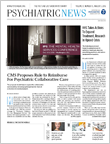By Peter Ureste, M.D.
Last year was the first time I attended IPS: The Mental Health Services Conference. I attended as an awardee of the APA’s Public Psychiatry Fellowship. I had not yet attended IPS so I had no idea what to expect. As I approached the registration table, my first impression was extremely positive—everyone was warm, smiling, and welcoming. I also came across a few colleagues whom I knew from prior social advocacy experiences. This led me to realize that many people who attend this conference are like-minded and share an interest in social justice and commitment to caring for underserved communities.
I was impressed by how approachable the other attendees were. Many of them gave me their business cards and made themselves available for mentoring. The list of workshops was also impressive! I attended a workshop on the Black Lives Matter Movement, and every seat was taken. In fact, conference staff had to bring in more chairs to accommodate those who had had no choice but to sit on the floor.
I also attended a workshop on sexual trafficking of black women and acquired greater knowledge about this issue, particularly signs to look for during clinical visits that may suggest a patient is a survivor of sex trafficking. After the session, I met one of the presenters. Later we met for coffee and discussed the problems affecting both of our inpatient psychiatric units. She was training in New Orleans, and I was in Los Angeles. Both of our county inpatient units cared for marginalized patients, many who were the sickest of the sick in our cities and turned to public hospitals as their safety net. We also shared the initiatives in our hospitals that were addressing barriers to care.
Another special aspect of the IPS is that attendees include not just psychiatrists but also nurses, social workers, physician assistants, pharmacists, psychologists, students, and lawyers. This multidisciplinary group of attendees is a unique aspect of the conference that allows for richer conversations about patient care and the overall health care system.
I strongly recommend that residents—and members in general—attend IPS to find out for themselves what makes this conference so intimate and special.
By Amy Gajaria, M.D.
Like Peter, last year was my first year attending IPS: The Mental Health Services Conference. Before last year, I thought that the Annual Meeting was APA’s only educational conference. I’m so glad that I got to discover IPS as part of my Public Psychiatry Fellowship with APA! IPS is one of the friendliest conferences I’ve ever attended. Some academic conferences can feel intimidating, particularly because I’m a resident, but at IPS everyone was approachable and really wanted to meet each other and share ideas.
At last year’s conference, I was lucky enough to attend a great session on an innovative program on integrating legal and mental health services for families experiencing domestic violence and a session discussing how APA could function as a nongovernmental organization at the United Nations. I liked that there was a mix of sessions with different perspectives, but all were clinically relevant and focused on improving care for underserved populations within the mental health system.
I also appreciated meeting psychiatrists from throughout the United States and Canada as well as a number of other countries who shared my interests. Sometimes I feel somewhat isolated at my institution with regard to my interests, so a real draw of attending the IPS is the chance to meet and learn from like-minded colleagues.
I did miss out on one evening session I wanted to attend, though. I had heard of this musical called “Hamilton” and thought I’d try to get some tickets by waiting in line for the lottery. I figured there might be only 10 or 15 other people there, so it was worth a shot. While that endeavor was unsuccessful, I was successful at visiting some great innovative programs for people with mental illness in New York City that were sources of inspiration for me coming home to Toronto (and I did buy a copy of the “Hamilton” cast album—which is basically the same as seeing it on Broadway, right?). ■


